About us
Welcome to Motor Matcher! A faster, simpler way to compare, buy and sell cars online.
In Australia, the average new car consumes a staggering 6.9 litres of fuel per 100 kilometres, while drivers in Europe and the US enjoy much more fuel efficient rides, averaging just 3.5 litres and 4.2 litres, respectively. This means Australians are forking out nearly $1,500 a year on fuel, compared to $886 in the US and a mere $738 in Europe. With petrol prices on the rise, it’s clear that embracing the tips for fuel efficient driving is no longer just a choice; it’s a necessity.
Making smart decisions about your driving habits and vehicle upkeep can significantly cut your fuel costs and help the environment at the same time. As the push for greener practices gains momentum, now is the perfect moment to discover how you can drive more intelligently and sustainably on Australian roads.
If you are eager to learn why fuel efficiency matters and want practical tips for fuel efficient driving, vehicle recommendations, and insights into how your choices make a difference, keep reading. Together, we can pave the way for a more sustainable driving experience in Australia, ensuring that every trip benefits both your wallet and our planet.
What’s Inside?
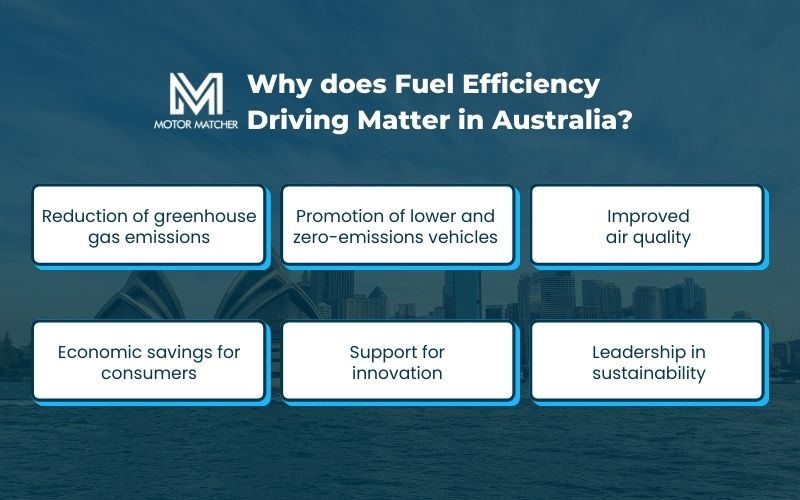
Fuel-efficiency driving is essential for fostering a sustainable future in Australia. By prioritising efficient driving practices and supporting fuel efficient cars, we can reduce emissions and contribute to a healthier environment. The following are the key reasons why fuel efficiency matters:
Fuel efficiency standards help limit carbon emissions from the nation’s fleet of cars. This reduction is crucial for mitigating climate change impacts that threaten both ecosystems and communities. Through driving fuel efficient vehicles, we can collectively lower our carbon footprint.
Setting maximum average emissions encourages manufacturers to innovate and produce more environmentally friendly vehicles. This shift not only benefits the environment but also offers consumers a wider range of sustainable options. As demand grows, manufacturers are incentivised to improve their technology and reduce emissions.
Reducing emissions leads to cleaner air, benefiting public health and the well-being of communities. Better air quality can decrease respiratory issues and enhance overall quality of life. A commitment to fuel efficiency can significantly contribute to a healthier environment for all Australians.
Fuel efficient driving habits can lower fuel costs, allowing Australians to save money while reducing their environmental impact. Over time, these savings can add up, providing financial relief in an era of rising fuel prices.
Increased demand for fuel efficient and electric vehicles drives technological advancements in the automotive industry. This innovation can lead to better performance, safety, and convenience in modern vehicles.
Australia can position itself as a leader in the global shift towards sustainable transportation solutions by embracing fuel efficiency. This leadership role can inspire other nations to follow suit and commit to greener practices.
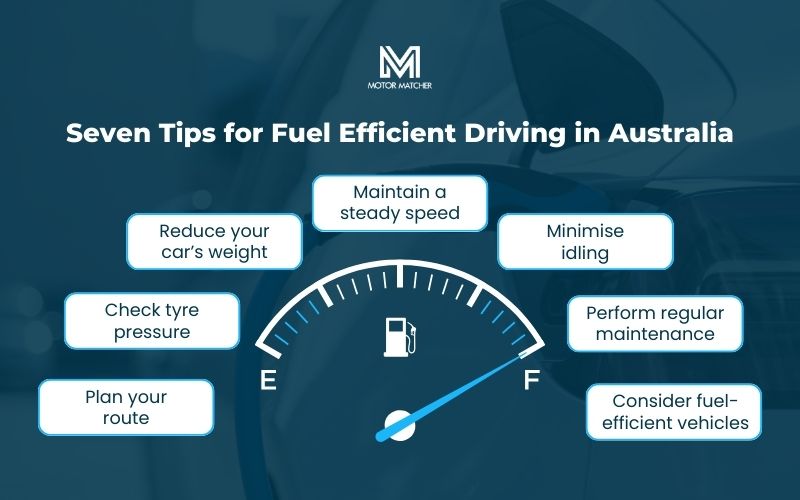
You can maximise fuel efficiency and limit carbon emissions with small adjustments to your driving style and vehicle maintenance. Here are seven effective tips for fuel-efficient driving that will help you drive smarter and greener on Australian roads:
Before you hit the road, take a moment to plan your route. Use a navigation app to identify the quickest and most efficient paths, avoiding traffic congestion and roadworks. This not only saves you time but also reduces fuel consumption by preventing unnecessary stops and starts.
Under-inflated tyres create more rolling resistance, which means your engine has to work harder, consuming more fuel. Check your tyre pressure regularly, especially before long trips, and inflate them according to the manufacturer's recommendations. Properly inflated tyres can improve your vehicle's efficiency by up to 3%.
The heavier your vehicle, the more fuel it requires to operate. Take the time to remove unnecessary items from your car, like roof racks or unused sports equipment, that can add extra weight. Every kilogram counts, so consider what you need for each trip.
Maintaining a consistent speed can greatly enhance your fuel economy. Frequent acceleration and braking waste fuel, so try to use cruise control on highways to help keep your speed steady. Anticipate traffic flow to reduce sudden stops, and maintain a safe following distance to allow for smoother driving. This not only saves car fuel but also contributes to safer driving practices.
Idling consumes fuel without moving you forward, which can be a significant waste. If you find yourself stopped for more than a minute or two, consider turning off the engine. This is particularly relevant in traffic jams or when waiting for someone.
Regular vehicle maintenance is essential for optimal fuel efficiency. Schedule routine checks for your engine, filters, and fluids to ensure everything is running smoothly. A well-maintained vehicle operates more efficiently, which translates into better fuel economy.
If you're in the market for a new car, consider investing in a fuel efficient model. Look for vehicles with high fuel economy ratings, such as hybrids or those equipped with advanced technologies. These cars can save you money at the pump and often come with added benefits, like lower emissions and government incentives. Making an informed choice about your vehicle can have a long-term impact on both your wallet and the environment.
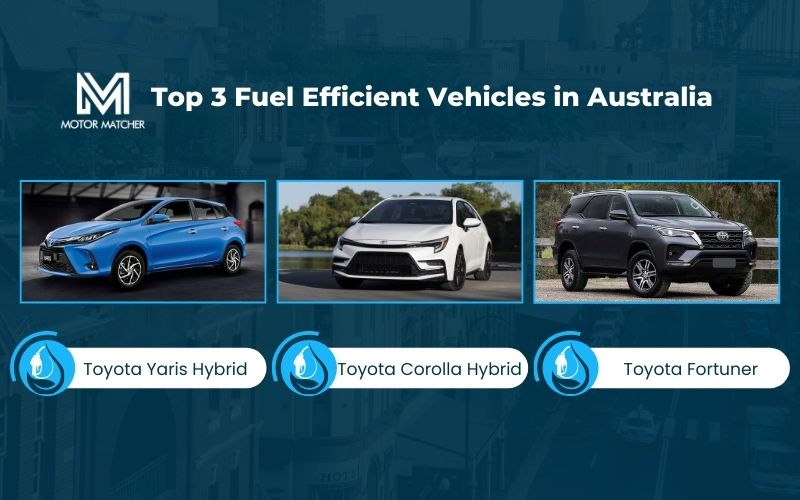
One of the best tips for fuel efficient driving is to switch to a fuel efficient vehicle. Transitioning to fuel efficient vehicles not only eases the burden of fuel costs but also offers a more sustainable way to travel. With access to a wider range of affordable lower and zero-emissions vehicles, drivers can enjoy significant savings while contributing to a greener future.
Here are three top fuel efficient vehicles in Australia that can help you navigate these challenges:
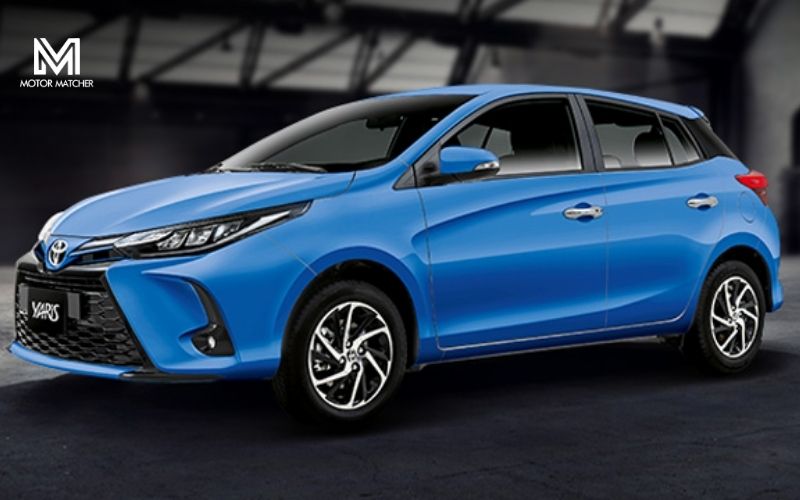
The 2020 Toyota Yaris Hybrid stands out as the most efficient car we've ever tested, achieving an impressive 59.3 mpg. This hatchback comes with a 5-star ANCAP safety rating, ensuring peace of mind for you and your passengers. With a hybrid or petrol engine option, its fuel economy ranges from 3.3L/100km to 7.6L/100km, depending on the model. Plus, the flexible rear space can be configured to suit your storage needs, making it a versatile choice for urban driving.

The 2019 Toyota Corolla Hybrid is another excellent option for fuel-conscious drivers. Toyota claims it consumes just 3.9 litres per 100 kilometres in mixed driving conditions, with urban figures matching that efficiency. On highways, it slightly increases to 4.2L/100km, making it well-suited for both city commutes and longer trips. Its stylish design and comfortable interior make it a practical choice without sacrificing efficiency.
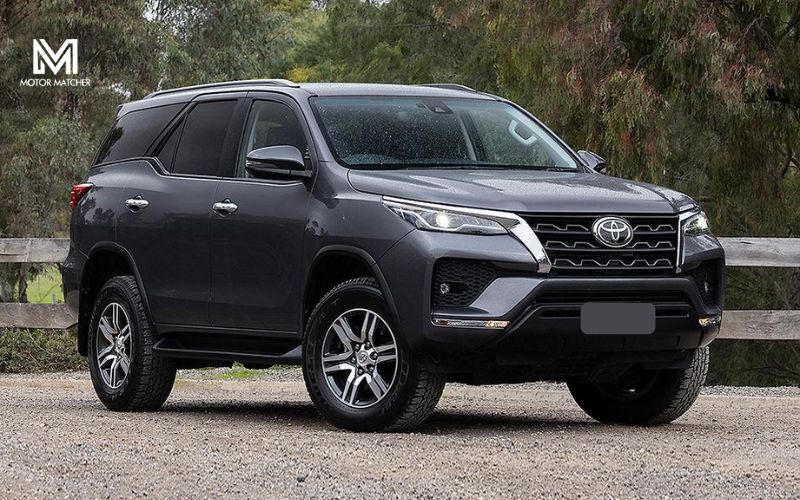
The Toyota Fortuner stands out as one of the top fuel-efficient vehicles, particularly in city settings. With mileage ranging from 10.3 to 14.0 km/l based on personal calculations, this SUV offers impressive performance for urban driving. The Fortuner delivers around 13.5 km/l when cruising at speeds of 50-70 km/h, which is commendable for a diesel engine vehicle. This balance of efficiency and performance makes it a practical choice for those looking to save on fuel without sacrificing comfort or capability.
Ready to save money at the pump and reduce your carbon footprint? Fuel efficient driving is not just a trend, it is a smart lifestyle choice that benefits both your wallet and the environment. By implementing the provided tips for fuel efficient driving, like planning your route, maintaining steady speeds, and keeping your vehicle well-maintained, you can significantly improve your fuel economy. Every small change adds up, making a big difference in your fuel expenses and helping to protect Australia’s stunning landscapes for future generations.
Join the movement towards more sustainable driving practices. Explore the latest fuel efficient vehicles that combine technology and comfort to elevate your driving experience. Take the first step today, your journey to smarter driving starts now.